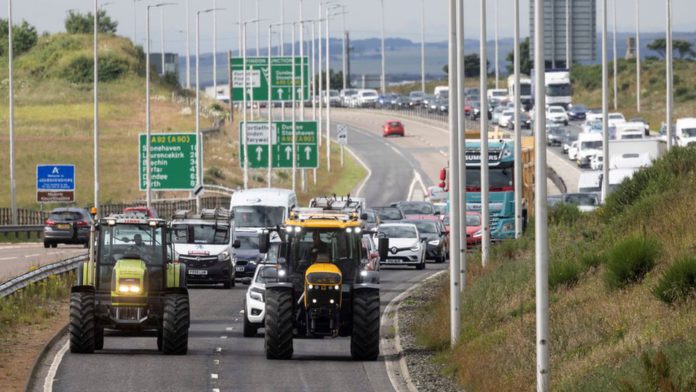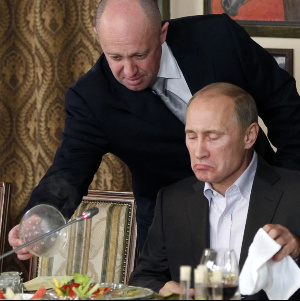Fuel protesters arrested for driving slowly

More than a dozen protesters have been arrested for driving too slowly during demonstrations on motorways in England, Wales and Scotland over fuel prices.
The go-slow action is mainly targeting three-lane motorways with convoys of vehicles crawling along two lanes – leaving the “fast” outside lane free.
Twelve people were arrested after a protest on the M4, which led to the Prince of Wales Bridge, between England and Wales, being closed.
Another man was arrested near the A38.
Protesters, organised under the social media banner Fuel Price Stand Against Tax, have driven in a series of convoys at 30mph (48.3km/h) to cause gridlock on major roads and motorways across Great Britain.
Chief Superintendent Tom Harding from Gwent Police said people had been arrested for driving under 30mph for a “prolonged amount of time”.
Among the roads affected by disruption have been:
- the M4 and Prince of Wales Bridge
- the M5 in Devon
- the M32
- the A38
- the M180 in Lincolnshire
- the A12 in Essex
- the A92 in Scotland
- the A64 near York
Gwent Police said organisers of the protest had been given a legal notice to prevent them from blocking the bridge over the River Severn and from driving under 30mph.
Ch Supt Harding said restrictions had been placed on the protest as otherwise “emergency and critical services” would have been restricted, posing a risk to the local community.
He added the force was aware of other driving offences not connected to the protests and these would be dealt with appropriately.
Two convoys of slow-moving vehicles had brought parts of the M4 to a standstill with vehicles travelling towards the crossing from both directions.
Tariq Akram said his was one of 50 vehicles making the 60-mile journey through Scunthorpe and Doncaster at 20mph.
The Scunthorpe truck driver told the BBC his company had added £4,000 to its fuel bill in the past four months because of rising prices.
“The turnout was absolutely fantastic.
“There were 35 vehicles from our yard alone who took part,” he said.
“At one point, I thought some cars wanted to overtake so I tried to let them by, then I realised they were joining in.”
BBC Radio Humberside’s Amanda White said when the convoy u-turned the queues were extraordinary with “hundreds if not thousands of vehicles nose to tail crawling along”.
She said while some motorists were angry others supported the protest and some even joined the convoy in their own vehicles.
Avon and Somerset Police said all protests in its area had finished and thanked the public for their patience in a tweet at about 15:20 BST.
On Monday, the force said there had been slow-moving roadblocks on the M4, M5 and M32 and predicted protesters to take a break before returning along the route.
Earlier, Devon and Cornwall Police said it was aware of a go-slow protest heading northbound from Exeter services of the M5.
The force also said a further protest began on the A38 heading north from Ivybridge, where a man in his 50s was arrested after ignoring a warning about unsafe driving.
“Unfortunately we have had unsafe driving on the A38 including vehicles travelling at a dangerously low speed,” a force spokesman said.
Police Scotland said it was aware of protests on motorways and trunk roads and urged motorists to drive at an appropriate speed for the road conditions.
But the force warned journey times could be longer than normal.
In Lincolnshire, police blocked junction one between the M180 and M18 forcing protesters to remain on the former.
West Yorkshire Police said officers had deployed a “single tyre deflation device” – also known as a “stinger” – at the Ferrybridge services in the early stages of the protest.
The force said the device had not been used, no damage had been done to vehicles and it had since been withdrawn.
West Mercia Police said some of the tactics used during a protest on the M54, which had ended by about 08:30 BST, had “compromised the safety of other road users” and said officers would take action against those who committed traffic offences.
A Facebook event called Stand Up to Fuel Prices, with more than 57,000 responses, called for people to take their cars, lorries and tractors to cause roadblocks all over the country “until there is change”.
The organisers wrote that fuel costs were driving up other costs of living and said they hoped the more people that joined the protest, the sooner livings costs would drop.
Fuel prices have risen to record highs in recent weeks with figures from data firm Experian showing the average price of a litre of petrol at UK forecourts had hit 191.5p and 199.0p for diesel on Sunday.
RAC fuel spokesman Simon Williams said there did not appear to be any sign of retailers reducing forecourt prices despite weekly wholesale costs having fallen for five weeks.
Gordon Balmer, executive director of the Petrol Retailers’ Association, which represents independent forecourts, said rising wholesale prices were related to international events and the weakness of the pound against the US dollar.
Chancellor Rishi Sunak has said he will carefully consider calls for a “more substantial” fuel duty cut after the 5p per litre reduction implemented in March failed to halt price rises.
Rising fuel prices have been pushed even higher by the war in Ukraine, with Russia, one of the world’s largest oil exporters, facing sanctions.
The government has said while it understands people are struggling with rising prices and have a right to protest, “people’s day-to-day lives should not be disrupted” and warned traffic delays “will only add to fuel use”.
Howard Cox, founder of campaign group FairFuelUK, said other countries had cut fuel duty more than the UK and called for a reduction of at least 20p.
While he said his organisation was not involved in the protests he said there was an appetite for them and if the government did not deliver on the issue there could be “some serious escalation of protests”.





